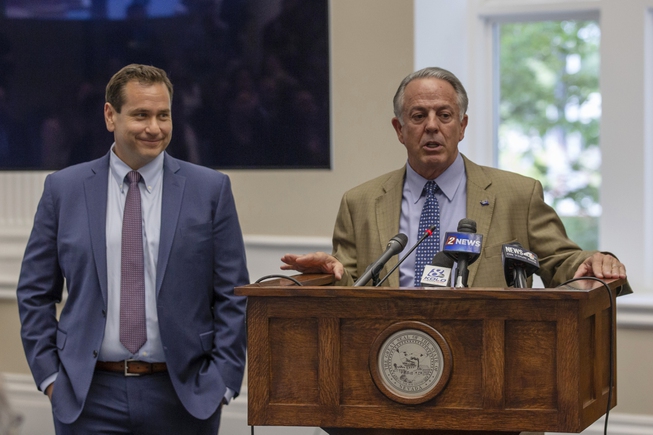
Tom R. Smedes / AP
Nevada Governor Joe Lombardo, right, speaks before signing an election worker protection bill into law as Secretary of State Cisco Aguilar looks on at the old Assembly Chambers in Carson City, Nev., Tuesday, May 30, 2023.
Tuesday, May 30, 2023 | 4:40 p.m.
CARSON CITY — Gov. Joe Lombardo on Tuesday signed into law legislation that makes threats of intimidation and harassment or violence against election workers a felony, while taking the day to also sign an abortion protections bill and veto a pair of measures with overwhelming bipartisan support.
Senate Bill 406, which goes into effect immediately, was signed into law alongside Secretary of State Cisco Aguilar and about two dozen election workers or county clerks from across the state at a ceremonial signing inside the Capitol building. It cleared both the state Senate and Assembly unanimously.
The law makes it a crime, punishable by category E felony, to “use, threaten or attempt to use” any force, intimidation, coercion, restraint or otherwise “undue influence” to interfere with the official duties of a registrar, clerk or any deputy in an elections division of a county or city, among others. Aguilar, a first-term Democrat from Las Vegas, championed the bill’s signing and said it was essential for protecting not only civil servants but democracy itself.
“Election workers, you are our heroes, and you are the reason why democracy works,” Aguilar said. “You serve our state with the utmost integrity and dedication, and as elected officials, we can’t thank you enough.”
The law also prohibits anyone from disseminating personally identifying or other sensitive information of an election worker without their consent. Lastly, provisions of the law also require the secretary of state, state treasurer, state controller or attorney general from soliciting or accepting any political contributions during a legislative session, or the 30 days before or after a session.
The latter provision puts the rest of the state’s constitutional executives on the same footing as state lawmakers, the governor and the lieutenant governor.
Lombardo, however, emphasized that the bill will help bolster election security and give peace of mind to those interested in volunteering in an election.
“It’s important we’re protecting the integrity of our elections and our employees across the board,” Lombardo said. “Hopefully, this will help in that area. We know it’s not absolute. There will be flames, I’m sure, (but) we’re going to respond and take care of business.”
Election officials across Nevada reported several instances of alleged intimidation in the days and weeks following the 2022 general election, though no statewide database exists to track such instances, Aguilar said after the ceremony. Establishing a database tracking worker intimidation would take coordination from law enforcement agencies and the state’s 17 counties, Aguilar added.
“I want election workers to know that the secretary of state’s office has their back, and we’re going to stand up for them,” Aguilar said. “They shouldn’t have to worry about working in fear going to work every day.”
Earlier this month, a federal jury acquitted a Las Vegas man of charges that he had made threats to the secretary of state’s office the day after the Jan. 6, 2021, insurrection at the U.S. Capitol.
Gjergi Juncaj was accused of calling the office four times over an 18-minute stretch on Jan. 7, 2021, and had allegedly told a woman answering the phones that her and others in her office were “all going to die,” according to the Associated Press.
Juncaj was not charged with a crime in Nevada because no such law existed when Juncaj allegedly called in the threats, Aguilar said. But that won’t be the case moving forward.
“He would not be a free man today,” Aguilar said. “Because the law is absolutely clear what we would do if someone were harassing or intimidating an election worker.”
Lombardo protects
abortion access
Lombardo also signed into law SB 131, which shields doctors and abortion seekers from out-of-state legal action from places where the procedure is restricted or banned. The law codifies an executive order issued last June by then-Gov. Steve Sisolak shortly after the U.S. Supreme Court ruled to overturn its 1973 ruling in Roe v. Wade, which was interpreted as a constitutional right to abortion.
Lombardo, a Republican who was endorsed by anti-abortion groups like Right to Life Nevada, said previously he would sign a “clean” version of the bill after switching his stance on the campaign trail.
Vetoes on mental health, debt collector reform
Bills that sought to create a statewide mental health consortium and require debt collection agencies to send a so-called “payoff” letter when requested by a debtor were both vetoed, despite heavy bipartisanship from both bills.
AB 223 passed 20-0 in the state Senate last week and 38-2 in the Assembly on April 21. As written, the bill would have compelled debt collection agencies to compel both payoff letter and “satisfaction” letters once a claim has been either asserted or resolved with a debtor. In a veto message issued by Lombardo’s office, the governor said he rejected the bill on grounds it created a “private right of action.”
While praising the intent of the bill, Lombardo criticized AB 265, which cleared unanimously through both legislative chambers, for the lack of a fiscal note attached to the bill while adding that it would have created an “unnecessary layer of bureaucracy.”
The bill had two fiscal notes, according to the state’s online legislative database, being reported by the Legislative Counsel Bureau and Nevada Department of Health and Human Services, though the fiscal impact on both agencies totaled $0.
The Legislature could still override the vetoes, since they passed with veto-proof majorities.
